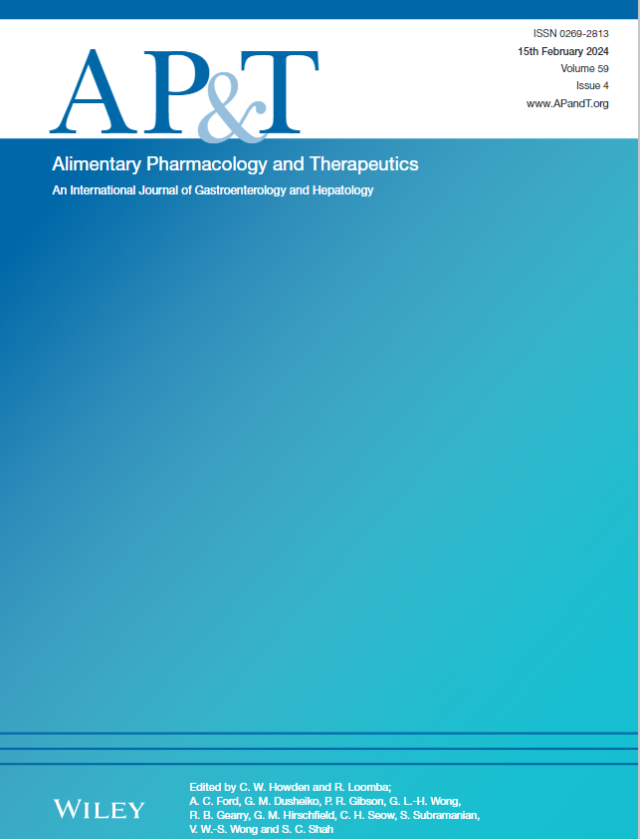Prevalence and Predictors of Symptoms of Anxiety or Depression at Diagnosis in Patients With Inflammatory Bowel Disease: An Inception Cohort
IF 6.6
1区 医学
Q1 GASTROENTEROLOGY & HEPATOLOGY
引用次数: 0
Abstract
BackgroundThe prevalence of symptoms of a common mental disorder, including anxiety or depression, is high among patients with established inflammatory bowel disease (IBD). This may represent a therapeutic target for affected patients. However, whether these symptoms arise from genuine gut‐brain effects, or are merely a consequence of a preceding adverse disease course is unclear.AimsTo assess prevalence and predictors of anxiety and depression in an inception cohort of patients with IBD.MethodsWe collected demographic data, disease‐related information, diagnosis of a pre‐existing common mental disorder, symptoms of a common mental disorder, using the hospital anxiety and depression score, and gastrointestinal symptom‐specific anxiety, using the Visceral Sensitivity Index (VSI), from individuals newly diagnosed with IBD during their index outpatient appointment or inpatient admission. The prevalence of symptoms of a common mental disorder at diagnosis, and predictors of the presence of these symptoms, were examined.ResultsOf 300 participants, 117 (39.0%) reported symptoms of a common mental disorder (107 (35.7%) anxiety, 47 (15.7%) depression). Younger age, female sex, tobacco use, a longer duration of symptoms prior to diagnosis, higher gastrointestinal symptom‐specific anxiety, and stressful life events in the preceding 12 months were associated with a significantly increased likelihood of reporting these symptoms. Higher gastrointestinal symptom‐specific anxiety remained significant following logistic regression (OR 2.19; 95% CI 1.00–4.79 for VSI moderate and OR 13.5; 95% CI 5.86–31.2 for VSI high,炎症性肠病患者诊断时焦虑或抑郁症状的患病率和预测因素:一个初始队列
背景:炎症性肠病(IBD)患者普遍存在焦虑或抑郁等常见精神障碍症状。这可能是受影响患者的治疗靶点。然而,这些症状是由真正的肠脑效应引起的,还是仅仅是先前不良病程的结果尚不清楚。目的评估IBD患者焦虑和抑郁的患病率及其预测因素。方法:我们收集了人口统计数据、疾病相关信息、先前存在的常见精神障碍的诊断、常见精神障碍的症状(使用医院焦虑和抑郁评分)和胃肠道症状特异性焦虑(使用内脏敏感性指数(VSI)),这些数据来自于新诊断为IBD的个体,在他们的门诊预约或住院期间。对诊断时常见精神障碍症状的患病率以及这些症状存在的预测因素进行了研究。结果在300名参与者中,117人(39.0%)报告了常见精神障碍的症状(107人(35.7%)焦虑,47人(15.7%)抑郁)。年龄较小、女性、吸烟、诊断前症状持续时间较长、较高的胃肠道症状特异性焦虑和前12个月的紧张生活事件与报告这些症状的可能性显著增加相关。在logistic回归后,较高的胃肠道症状特异性焦虑仍然显著(OR 2.19;中度VSI的95% CI为1.00-4.79,OR为13.5;VSI高95% CI 5.86-31.2, p <;0.001表示趋势)。结论心理健康状况不佳在IBD诊断时非常普遍,提示存在真正的肠脑效应。
本文章由计算机程序翻译,如有差异,请以英文原文为准。
求助全文
约1分钟内获得全文
求助全文
来源期刊
CiteScore
15.60
自引率
7.90%
发文量
527
审稿时长
3-6 weeks
期刊介绍:
Alimentary Pharmacology & Therapeutics is a global pharmacology journal focused on the impact of drugs on the human gastrointestinal and hepato-biliary systems. It covers a diverse range of topics, often with immediate clinical relevance to its readership.

 求助内容:
求助内容: 应助结果提醒方式:
应助结果提醒方式:


